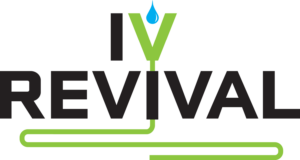February is American Heart Month, and we at IV Revival wanted to show some love to our hearts by clarifying what vitamins actually work for heart health. Many medical literatures claim that antioxidants, folic acid, vitamin E, niacin (vitamin B-3), and beta carotene are beneficial to your heart, but actually, they show no real benefits in either preventing or treating heart disease.
So…what does work?
Omega-3 fatty acids
According to the authors of the 2019 review, omega-3 fatty acids are amazing at protecting your heart! They act as a shield to reduce your risk of heart-related diseases and events!
The first of the reviewed studies dealt with omega-3 fatty acid esters (O3AEE). O3AEE is a prescription version of omega-3 fatty acids. It’s approved by the Food and Drug Administration for the treatment of high triglycerides — a type of fat found in your blood related to heart problems.
In fact, researchers discovered that taking O3AEE regularly led to a 28 percent reduced risk of heart attacks, a 50 percent reduced risk of dying from a heart attack, and a 17 percent reduced risk of total coronary heart disease events.
Before you rush to the store to get omega-3’s, you should know that they come from fish oils. This means there is a risk of mercury contamination in over-the-counter medication. Therefore talk with your doctor about your risk and ask if they can prescribe you O3AEE, which has no risk of mercury contamination.
Magnesium
Ensuring you’re getting enough magnesium in your diet is a way to ward off heart diseases. Low magnesium has been linked with cardiovascular risk factors such as: high blood pressure, arterial plaque build-up, calcification of soft tissues, cholesterol and hardening of the arteries.
The 12-year ARIC study found that the rate of sudden cardiac death among participants with the lowest magnesium levels in the blood was 2.41 per 1,000 people per year, compared to those with high levels at .98 per 1,000.
Magnesium supplements come in various forms and mineral combinations, such as magnesium citrate, magnesium oxide, magnesium gluconate, magnesium hydroxide and more. In many forms, magnesium is great at treating indigestion, migraines, stress, and muscle soreness as well. When it comes to your heart, early research shows that magnesium taurate, glycinate, and orotate can promote heart health and lower blood pressure.
You can take magnesium in a variety of ways, including orally through food or supplements. IV vitamin therapy is becoming increasingly popular for getting your much needed dose of magnesium too!
Coenzyme Q10
Multiple studies have looked at the use of coenzyme Q10 (a chemical in your body), primarily for two conditions: statin-associated myopathy syndrome (SAMS) and congestive heart failure.
Congestive heart failure is a condition in which the heart can’t pump blood as well as it should.
People with the condition may have symptoms such as:
-
Difficulty Breathing
-
Tiredness
-
Weakness
-
Fluid Retention
-
Irregular Heartbeat
-
Chest Pain
People with heart failure tend to have a deficiency in coenzyme Q10 in their blood and heart muscle tissue. Perhaps the strongest evidence in favor of coenzyme Q10 in the treatment of congestive heart failure is the Q-SYMBIO trial.
During the 2-year trial, participants were given 100 mg of coenzyme Q10 three times a day.
After 2 years on the supplement, there were 43 percent fewer major adverse cardiac events in the treated group versus placebo group. In addition, there was a significant improvement in the severity of symptoms.
Unfortunately, CoQ10 isn’t as easy to get as the other two items on this list. While it is found in meat, fish and nuts, it’s not enough to significantly increase the amount already in your body. It is available in some dietary supplements and liquid medications.
Other Ways to Love your Heart
If you’re not into vitamins and supplements, don’t want to start taking them without your doctor’s input, or simply don’t need them, there are other ways to take care for your heart. Regular exercise, getting enough sleep, reducing your stress, and eating a balanced diet are all amazing things that your heart, mind, and body will thank you for!
If this is speaking your language a little more, we have some resources to help get you started. Check out our blog on vitamins that help get a better night’s sleep, and our blog on destressing.
Lastly, must remember that you only have one heart. You should love it and take care of it just like it takes care of you. You may not count every beat, but you should start counting out all the ways you can help that muscle stay strong for many more years to come.
